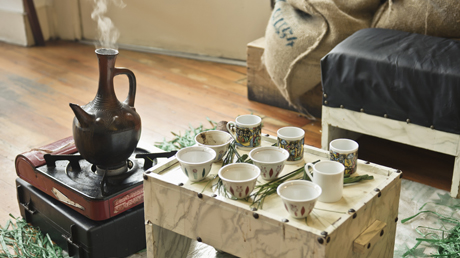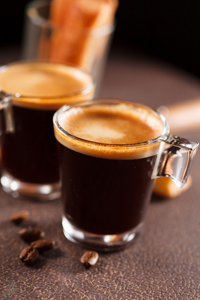Pictures: www.clickatlife.gr
The war against coffee started even earlier than the war which Richard Nixon declared against drugs. However, it has had equally unsuccessful results. For centuries, coffee has been associated with bans, attempts for control, price increases and the black list of religions. However, it always comes to the forefront – through ports, the black market, or mixed with acorns or broad beans. Despite attempts for control, it gets cheaper over the years.
Even the alleged discovery of coffee is associated with a ban. In the 9th century in Ethiopia, a young shepherd saw his animals eating the fruit of a bush, and they would become restless afterwards. He brought some beans to the imam, who sensed a latent drug in them and threw them into the fire.

After roasting, however, they acquired a wonderful aroma, and once removed from the embers they were placed in a pot with hot water. It was more or less in this way that the first cup of coffee appeared. The story was first mentioned in a French text of the 17th century, which describes the unique nature of coffee and puts it among attractive but dangerous substances.
Coffee travelled from Ethiopia to Yemen in the beginning of the past millennium and its name comes from the Arabic word "qahwah". Mokha is a port in Yemen. Cafes were opened across the Islamic world from Medina to Baghdad where customers met and talked about politics. In Istanbul, coffee was so popular that according to Alexandre Dumas imams complained that mosques were empty while cafes were crowded.
Coffee was forbidden in Mecca from 1511 until 1524, and when Sultan Murat came to the throne in 1574, he immediately killed his five brothers and defined coffee as undesirable. His successor Mehmet prohibited all cafes and when his order was violated, owners and their customers were thrown into the Bosphorus, tied up in sacks. Eventually, authorities abandoned their resistance to coffee and it became part of the West’s cliché about Turkey.

By the end of the 16th century, many European sailors had tried the drink when traveling to the east. The first coffeehouse in Europe opened in Venice in 1645, followed by cafes that appeared in England. By 1675, there were more than 3,000 cafes and King Charles II tried to declare them places which gathered people "dissatisfied with His Majesty". These attempts were unsuccessful, as expected. Lloyd’s café developed as the most important insurance company in the world. Prohibition failed in pre-revolutionary France, too.
The first coffee in Europe was prepared in the way which is used today in the Middle East. Beans are boiled several times until a very bitter drink is obtained. In 1750, the French created a prototype of the coffee pot, and in 1855 the first espresso appeared.

When making espresso, hot water is pressed through freshly ground beans and takes out a mixture of their natural oil, thus giving an enhanced flavour. It is possible that espresso was named after the speed at which it is prepared and because it is prepared expressly for each customer. Espresso is a great combination of technology and nature.
Today Brazil is the largest coffee producer, producing about one-third of the coffee in the world, which is more than twice as much of the country that follows it. Coffee developed well during the industrial era. Decaffeinated coffee is produced by placing beans under steam and caffeine is extracted by washing with a solvent. Most people cannot detect the difference in a blind tasting, since caffeine has no flavour. Instant coffee was discovered in 1906.
Coffee is extremely popular and it is the third drink in terms of consumption, following water and tea, and the second most traded commodity following olive oil. Although many studies by doctors try to show a link between the use of caffeine and almost all diseases, its use provides as many positive effects on the body. In any case, it is unlikely that any medical opinion will change the habit of millions of people who love coffee because of its unique taste and its beneficial qualities.